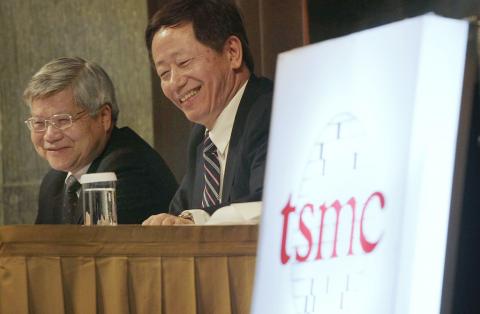Taiwan Semiconductor Manufacturing Co (TSMC, 台積電) yesterday forecast better-than-expected sequential growth of 22 percent in revenue this quarter after the world’s top contract chipmaker posted a quarterly net profit that beat analysts’ expectations, fueled by resilient smartphone demand.
Revenue is expected to swell to between NT$180 billion and NT$183 billion (US$5.97 billion and 6.07 billion) in the current quarter, compared with NT$148.22 billion last quarter, with the strongest growth from the communications segment, TSMC chief financial executive officer Lora Ho (何麗梅) said.
The “unseasonably strong” growth cited by TSMC exceeds the 15 percent sequential expansion estimated by Credit Suisse analyst Randy Abrams. He forecast that TSMC’s revenue would expand to NT$169 billion this quarter.

Photo: Reuters / Pichi Chuang
Abrams retained his “outperform” rating on TSMC with a target price of NT$130.
“Since mid-January, we started to see strong orders across all segments. We now adjust our demand outlook,” TSMC co-CEO Mark Liu (劉德音) said. “First, the demand for smartphones appears healthier than we expect. Second, our 28-nanometer technology’s performance and quality have helped fuel more customer demand.”
As inventory for chip designers remains lower this quarter than the typical seasonal level, “we expect that our demand will continue to be strong and above seasonal [norms] in all major regions,” Liu said.
Liu said the company would also see positive sequential growth in the third and fourth quarters, but the growth would “be normal and be more moderate than the second quarter,” as customers’ inventory would return to seasonal levels in the middle of this year, he said.
TSMC said it is to ship a high volume of 20-nanometer chips in the second half of this year and start mass production of next-generation 16-nanometer chips next year as scheduled.
The company expects the global semiconductor industry to see revenue grow by 7 percent annually this year, compared with a 5 percent increase estimated three months ago, and chip designers would see revenue rise by 9 percent annually from 8 percent previously forecast, Liu said.
The chip foundry industry would expand revenue by 14 percent this year, up from an earlier 10 percent prediction, Liu said. TSMC’s revenue growth this year would outpace the rest of the industry by several percentage points, he said.
During the quarter ending March 31, TSMC’s net profit expanded 6.8 percent to NT$47.87 billion, or NT1.85 per share, compared with NT$44.81 billion, or NT$1.73 per share, in the fourth quarter of last year. On an annual basis, the figure represented a growth of 21 percent.
Gross margin improved to 47.5 percent last quarter from 44.5 percent in the fourth quarter of last year, while operating profit margin rose to 35.4 percent from 32.8 percent.
This quarter, TSMC expects gross margin to climb to between 47.5 percent and 49.9 percent, while operating profit will rise to between 36.5 percent and 38.5 percent.
Liu said revenue contribution from high-end smartphones would rise to US$14 per unit this year, from US$10.8 last year.

KEEPING UP: The acquisition of a cleanroom in Taiwan would enable Micron to increase production in a market where demand continues to outpace supply, a Micron official said Micron Technology Inc has signed a letter of intent to buy a fabrication site in Taiwan from Powerchip Semiconductor Manufacturing Corp (力積電) for US$1.8 billion to expand its production of memory chips. Micron would take control of the P5 site in Miaoli County’s Tongluo Township (銅鑼) and plans to ramp up DRAM production in phases after the transaction closes in the second quarter, the company said in a statement on Saturday. The acquisition includes an existing 12 inch fab cleanroom of 27,871m2 and would further position Micron to address growing global demand for memory solutions, the company said. Micron expects the transaction to

Vincent Wei led fellow Singaporean farmers around an empty Malaysian plot, laying out plans for a greenhouse and rows of leafy vegetables. What he pitched was not just space for crops, but a lifeline for growers struggling to make ends meet in a city-state with high prices and little vacant land. The future agriculture hub is part of a joint special economic zone launched last year by the two neighbors, expected to cost US$123 million and produce 10,000 tonnes of fresh produce annually. It is attracting Singaporean farmers with promises of cheaper land, labor and energy just over the border.

US actor Matthew McConaughey has filed recordings of his image and voice with US patent authorities to protect them from unauthorized usage by artificial intelligence (AI) platforms, a representative said earlier this week. Several video clips and audio recordings were registered by the commercial arm of the Just Keep Livin’ Foundation, a non-profit created by the Oscar-winning actor and his wife, Camila, according to the US Patent and Trademark Office database. Many artists are increasingly concerned about the uncontrolled use of their image via generative AI since the rollout of ChatGPT and other AI-powered tools. Several US states have adopted

A proposed billionaires’ tax in California has ignited a political uproar in Silicon Valley, with tech titans threatening to leave the state while California Governor Gavin Newsom of the Democratic Party maneuvers to defeat a levy that he fears would lead to an exodus of wealth. A technology mecca, California has more billionaires than any other US state — a few hundred, by some estimates. About half its personal income tax revenue, a financial backbone in the nearly US$350 billion budget, comes from the top 1 percent of earners. A large healthcare union is attempting to place a proposal before